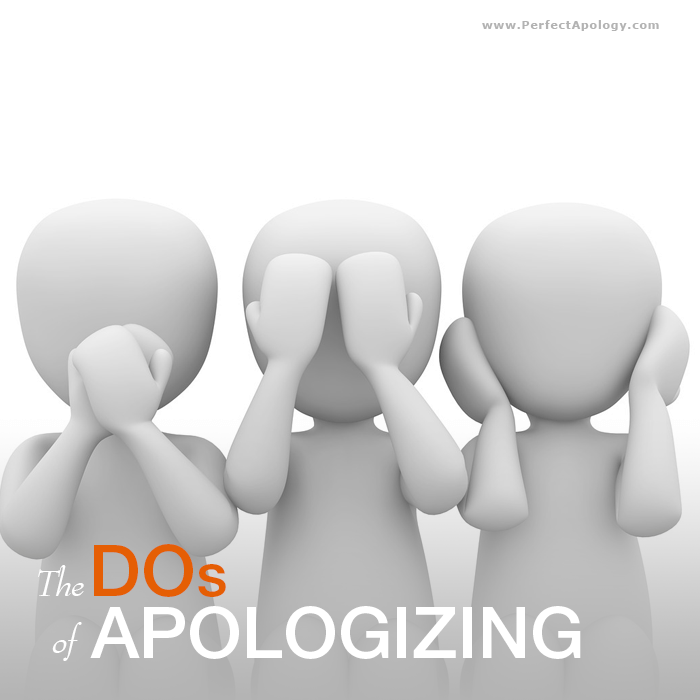Top 25 DOs When Apologizing
Our top 25 list of secondary considerations to keep in mind for that perfect apology—a quick reference guide of things to do and consider when apologizing.
Whether your apologizing to a friend, girlfriend or boyfriend, an ex or your family, there are definitely some DOs and DON'Ts to keep in mind.

The DOs of Apologizing
✔ Take the time to reflect on what you did wrong—and then take a little more time to reflect on what you did wrong.
✔ Use words that are very clear and accurately convey your thoughts and sentiments. Be absolutely honest and show true sincerity when apologizing.
✔ Use words that convey that you understand (and get) the other person's hurt feelings, and can appreciate why they're angry. Trying to convey or justify your feelings will likely be interpreted as you missing the point of an apology.
✔ When it comes to selecting from among the many approaches to apologizing, be sure the select the one that plays to your strengths.
A letter is a better option if you're a very nervous person, would prefer not to confront the person face-to-face for other reasons, or live far away.
If you do go this route, be sure to take the time to craft your apology letter carefully and run through a few re-reads to make sure the phrasing is perfect. Put it down and re-visit the letter the next day for the final draft before sending it along.
✔ Be as specific as you can about the mistake, and as clear as you can about your responsibility.
✔ Make sure the apology clearly conveys that you recognize not only why but how much the person was injured by your actions.
Saying "I know you were hurt" is not the same as saying "I know how incredibly insulted and angry you were because of..." The latter is a much better way to convey that you're accepting responsibility.
✔ Allow the person time to think about your apology—the time they take may vary but the offended person has the right to determine how much time that should be.
✔ Clearly request forgiveness but don't expect or demand it.
✔ If you decide to go the voice-mail route for your apology (instead of a face-to-face encounter or written apology), be sure to write out the apology anyway—and then practice reading before making the call. If you think the perfect apology will just flow off your lips after the beep, you're wrong. Write it out and practice it first.
![]()
✔ Give some thought to how long the apology should be—it usually depends on the enormity, complexity or ripple effects of the mistake you've made. Most apologies don't require more than a few well crafted sentences. Since apologies are sometimes awkward it may help to not include too much unnecessary detail. Longer than needed explanations often come across as self-serving.
✔ Be prepared to accept that the person might not forgive you, and acknowledge to them that you are prepared for that possibility and will accept it willingly.
✔ When acknowledging the offence make it clear that you understand ALL of the consequences of your actions—personal, emotional, relational, monetary, business, etc.
✔ Be sure to understand what the other person sees as the problem worthy of an apology, and be very specific—you can't apologize effectively if you don't know what you're apologizing for.
✔ Say "I'm sorry I was rude," not "I'm sorry if I was rude." Sorry "if" is one of those potentially costly qualifiers that can turn a good apology into a really bad one, so be careful. Words really matter. "I apologize for insulting you" is much better than "I apologize if what I said seemed insulting or offensive." And "I'm sorry I hurt your feelings" is never as strong as "I'm sorry I called you an idiot."
✔ Costly qualifier No.2 is the word "but", which should never be included as part of an apology. I'm sorry but... always comes off like you're trying to justify your actions.
✔ Write your apology down and read and rehearse it over a few times—it doesn't matter whether you intend to deliver it in writing, putting it down on paper will help you recall what you'd like to say when the time comes.
✔ When acknowledging the offence, name it and the hurt feelings it caused.
✔ Think about the cause of the offense, and convey the cause when extending your apology (e.g., why do you constantly forget dates; why are you so argumentative; why are you so dismissive of others opinions; etc). It's important for the offended person to understand you get it—but make sure you do in fact get it.
✔ Communicating vulnerability in an apology can help.
![]()
✔ Clearly convey appreciation for the role the person plays in your life and why the apology is so important—whether or not they accept it. Describe what you think you will lose if the relationship is permanently damaged.
✔ Convey the penalty you are willing to pay and tell them how you plan to solve things. But if you're not sure, ask the other person how you can repair the mistake.
✔ When apologizing in person (there may be alternate approaches better suited for your particular situation) be sure to do so one-on-one. On the other hand, if a public apology is warranted as an expression of your willingness to suffer the public (political consequences) then a one-on-one apology may be viewed as a cop out.
✔ Always be prepared for a very bad start to a verbal apology. For example, be ready to respond to something like, "You should be sorry, you idiot!", or "It's too little too late", or "I just can't trust you anymore", or "I've heard that one before", or "How do I know you won't do it again?" These kinds of reflexive responses or 'apology busters' may come from anger or hurt feelings, but you should be prepared to accept and deal with it.
A Note to Parents: Parents should consider discussing apologizing with their kids. It's an important lesson that should be taught as early as possible.
In fact, the very best approach parents can use to teach their kids is to apologize to them when they mess up, and to do so as often as required. This New York Times article sums it up nicely.
Body Language & How to Behave While Apologizing
✔ Be relaxed and make sure to look the person in the eye.
✔ Don't cross your arms or place your hands on your hips.
✔ Don't be defensive or angry (even with yourself)...
![]()
We hope that these guidelines help you understand what to DO and how to apologize, now let's take a look at things you should always avoid when saying sorry.


